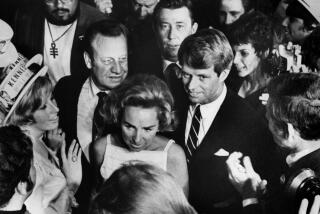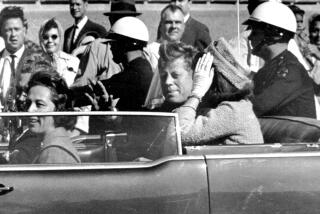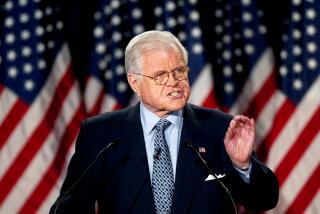Jacqueline Kennedy Onassis: Above All, an Eternal Image
- Share via
NEW YORK — Jacqueline Bouvier Kennedy Onassis died Thursday. Outside her Fifth Avenue apartment strangers gathered, strewed rose petals, lit candles. She was 64 and she had been a role model for thousands of women. She was loved by people she didn’t know and who didn’t know her. What they responded to was the image she presented. She was smart, brave, complicated and, one suspects, she understood that it was all--politics and fashion, Camelot and the pill-box hat--about image.
From the beginning the ambitious, beautiful newspaper woman who could speak perfect French and the ambitious, dashing, young senator who wanted to be President were a match out of central casting. No one who saw pictures of them on a state visit to France ever forgot the dazzling vision of Jackie in a white gown with her dark hair swept up. Even Gen. Charles DeGaulle, that fierce and austere war hero, melted when she smiled.
But scratch the surface and there was pain. John F. Kennedy was a womanizer, he suffered from Addison’s disease, he left his wife alone too much. Jackie was a spendthrift whose clothing bills were so huge they infuriated her millionaire husband. Yet together, he and she brightened the world.
In public, Mrs. Kennedy played her part in the pageant and what she felt in her heart, we never knew. Maybe it was none of our business. She was so good at what she did, the facade was enough. She gave citizens the White House tour, she issued invitations to dancers and classical musicians. She was so well bred, so elegant, such a magical creature that when she was pictured crawling in apparent terror on the back of the convertible after her husband’s murder, we were shocked. You might have done it, I might have done it, but Jacqueline Kennedy never seemed that weakly human.
More icon than flesh, she saw us through our immense national tragedy with a dignity few of us had ever before observed. We were suffering not only loss but shame that this had happened in the United States. Many credited her with giving us back our national pride. For she staged-managed her husband’s funeral--the eternal flame at the grave, the procession of world leaders walking behind the casket, the riderless horse, the little boy saluting his slain father. She was determined that John F. Kennedy’s martyrdom should echo Abraham Lincoln’s. And while nobody could sensibly equate Lincoln, who’s job was done, with Kennedy, whose job was just beginning, the country attempting to heal itself needed the sense of ritual she imposed on those terrible days.
Even the myth of Camelot was just that, a myth. Yet her use of it was effective. There never was a Camelot, it wasn’t history it was a fictional rendering of a court ruled over by a fictional king and while Mrs. Kennedy’s Camelot was an idealized projection--a public-relations selling job if you want to be crude about it--it was one we gratefully embraced. She tried to censor books that said anything she didn’t want said about the thousand days Kennedy had governed the country and her perfect manners masked an iron will. Even so, we appreciated that strength and her pride and her mystery.
Some turned against her when she married Aristotle Onassis. People said he was crude and cared only for power and celebrities and had caught the biggest celebrity in the world. People suddenly saw her as all style and no substance and said she loved money and had caught one of the richest men in the world. But when the marriage failed and he died, and she came back to us, all was forgiven.
Whether or not she considered herself a symbol we made her into one. Her children turned out well, she went to work though she had the means to be perfectly useless. She protected her privacy and we respected that. But because she so seldom spoke to us, because we so seldom heard her voice, because we never really knew her, we made her into whatever we wanted or needed her to be.
She was a genius at managing her image. She dealt with the press better than any movie star, though she appeared on no talk shows and gave few interviews. Despite this reserve, more people wanted to know about her than wanted to know about Elizabeth Taylor or the Princess of Wales.
For the most part, we saw her in ways she wanted to be seen. It was enough.
More to Read
The biggest entertainment stories
Get our big stories about Hollywood, film, television, music, arts, culture and more right in your inbox as soon as they publish.
You may occasionally receive promotional content from the Los Angeles Times.










